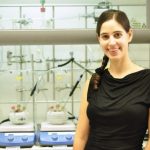Schulich Chemistry Faculty Now Hold 7 Prestigious ERC Grants
This includes more than 25% of the active faculty members, demonstrating a broad range of scientific excellence in chemistry.
Technion Schulich Chemistry Faculty’s Researchers Now Holds 7 Prestigious ERC Grants
The European Research Council announced last week that researchers at the Technion – Israeli Institute of Technology have been awarded a noteworthy five ERC Starting Grants, which are awarded to talented early-career scientists who completed their doctoral degrees only two to seven years ago, and have already produced excellent work, showing great promise.
With two of the five Starting Grants awarded to researchers at the Schulich Faculty of Chemistry, the faculty now holds a remarkable total of 7 active ERC Grants, including three Advanced Grants and two Consolidator Grants.
The ERC Advanced Grant is given to the best proposals by researchers who have a track-record of significant research achievements in the last 10 years.
The ERC Consolidator grant aims to help excellent scientists, who have 7 to 12 years’ experience after completing their PhDs, strengthen their research teams and pursue their most promising ideas.
The latter two types of grants, part of the EU’s Horizon Europe Program, are awarded to exceptional Principal Investigators who are demonstrated leaders in terms of originality and significance of their research contributions.
The Schulich Faculty of Chemistry Researchers and Their Grant-Winning Projects are:
Distinguished Professor Ilan Marek currently holds his second consecutive active Advanced Grants. The first focused on selective carbon-carbon bond activation through remote functionalization, creating complex scaffolds in a convergent and unified strategy whereas the current Advanced Grant focuses on the selective functionalization of unsaturated hydrocarbons, seeking a practical strategy for the synthesis of complex target molecules to strongly impact the fields of fine chemical synthesis, materials science and pharmaceutical industry.
Professor Ashraf Brik likewise holds an active ERC Advanced Grant. His and his group’s research specializes in developing synthetic methods for chemical synthesis of proteins with post-translational modifications in quantities that allow for them to be studied thoroughly. The grant focuses on the delivery and on-demand activation of chemically synthesized and uniquely modified proteins in living cells. They are developing a general approach for enabling considerably more detailed in-cell study of uniquely modified proteins by preparing proteins having the following features: 1) traceless cell delivery unit(s), 2) an activation unit for on-demand activation of protein function in the cell, and 3) a fluorescence probe for monitoring the state and the fate of the protein.
Assistant Professor Graham de Ruiter, who holds an ERC Consolidator Grant, is at the forefront of developing new environmentally benign chemical methodologies for organic synthesis. His research focusses on using cheap, non-toxic, and readily available earth-abundant metals as catalyst in chemical transformations that have hitherto been unknown via a classical organometallic approach with these metals. Reactions such as cross-coupling, alkene cross-metathesis, and C-H bond functionalization are now within research with these earth-abundant metals and are set the revolutionize the way chemistry will be performed in the future. The overall impact of these discoveries will influence many existing processes in the agricultural, fine-chemical, and pharmaceutical industry, where the use of earth-abundant metals in catalysis carries enormous potential.
Associate Professor Nadav Amdursky, yet another ERC Consolidator Grant holder, studies biological electron and proton transfer. In his new study, he will develop tools to explore the transfer of protons within proteins. To date, there are no direct means to measure specific proton-transfer pathways within proteins, and most research is based on following the end-product of the reaction. Among other applications, these tools will enable the group to answer questions relating to cellular respiration – the process by which cells convert nutrients into energy.
Associate Professor Lilac Amirav, an ERC starting Grant recipient, studies plasmon-enhanced photocatalytic nano-lithography. Her and her group’s research is concerned with unique design of innovative nano scale particles, which harness nano phenomena for improved activity, and methodologies for the construction of sophisticated heterostructures tailored for photocatalysis and energy conversion. The laboratory’s cutting-edge synthetic effort is combined with fundamental research focused on the dynamic and mechanism of photo-induced charge transfer processes, across the different components of 1the photocatalyst system and further into the solution.
Assistant Professor Yuval Shagam, a 2023 ERC Starting Grant recipient, focuses on understanding molecular chirality: a molecule or ion that cannot be superposed on its mirror image. Such molecules are often distinguished as either “right-handed” or “left-handed.” Molecular chirality plays a central role in many fields, ranging from reaction dynamics to drug development. The Starting Grant will allow Prof. Shagam and his team to realize the first trapped chiral molecular ion experiment in order to measure parity violation and detect the structural differences between enantiomers. The outcome can lead to an improved understanding of molecular physics as well as important applications for quantum-controlled chemistry experiments and quantum information technology.
Assistant Professor Charlotte Vogt, likewise a 2023 ERC Starting Grant recipient, works to solve problems of climate change and pollution by improving or inventing more sustainable processes. Metal nanoparticle-based catalysts are essential to shifting societal reliance away from fossil-fuel resources. Nearly all of these catalysts are currently found by slow, trial-and-error-based processes. The Starting Grant will allow Prof. Vogt and her team to advance the field through the development of a methodology to generate fundamental understanding of supported metal nanoparticle catalyst dynamics at work under relevant high-pressure conditions.









